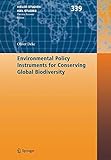Environmental Policy Instruments for Conserving Global Biodiversity / by Oliver Deke.
Tipo de material: TextoSeries Kieler Studien - Kiel Studies ; 339Editor: Berlin, Heidelberg : Springer Berlin Heidelberg, 2008Descripción: recurso en líneaTipo de contenido:
TextoSeries Kieler Studien - Kiel Studies ; 339Editor: Berlin, Heidelberg : Springer Berlin Heidelberg, 2008Descripción: recurso en líneaTipo de contenido: - texto
- computadora
- recurso en línea
- 9783540737483
- HC79.E5
Springer eBooks
Aim and Scope of the Study -- The Issues -- Market-Based Incentives to Preserve Biodiversity: Commercial Use of, and Trade in, Genetic Resources -- Preserving Biodiversity as a Global Public Good: Protected Areas and International Transfers -- Conclusion.
The current, unprecedented loss of global biodiversity resulting from anthropogenic interference in the world's ecosystems is affecting human well-being across the globe with increasing severity. This book examines two issues that are at the center of the public discussion on biodiversity. First, it examines whether genetic information derived from biodiversity can be used to create incentives to effectively preserve biodiversity. Second, it examines whether establishing and managing protected areas can be accomplished effectively on an international level by using transfer payments. It concludes that, although both approaches have their strengths, neither of them can provide a degree of preservation that is sufficient from a global perspective.
Para consulta fuera de la UANL se requiere clave de acceso remoto.


